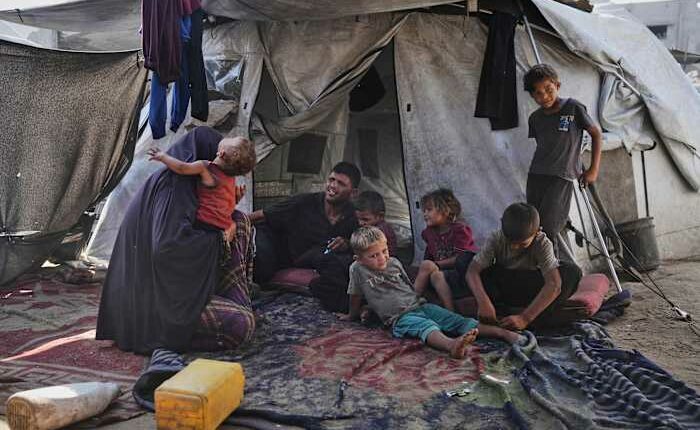Share this @internewscast.com

DEIR EL-BALAH – Each morning, Abeer and Fadi Sobh rise in their tent in the Gaza Strip and confront the same pressing dilemma: how to procure food for themselves and their six young children.
The couple considers three possibilities: perhaps a charity kitchen might be open, providing a pot of thin lentil soup. Alternatively, they could elbow their way through crowds to acquire some flour from a passing aid shipment. If all else fails, they would have no choice but to beg.
If those all fail, they simply don’t eat. It happens more and more these days, as hunger saps their energy, strength and hope.
Living in a seaside refugee camp to the west of Gaza City after multiple displacements, the Sobhs face the same dire circumstances as countless families scattered across the conflict-torn region.
According to humanitarian workers, hunger has intensified over the 22-month conflict due to restrictions on aid. Food experts cautioned earlier this week that “the worst-case scenario of famine is currently unfolding in Gaza.”
Israel imposed a total blockade on food and other supplies for two and a half months starting in March, announcing its aim to increase pressure on Hamas to free dozens of hostages seized during its attack on Israel on October 7, 2023.
Though the flow of aid resumed in May, the amount is a fraction of what aid organizations say is needed.
The deterioration of law and order has further complicated efforts to safely distribute food. A significant portion of the incoming aid is either hoarded or sold at exorbitant prices in markets.
Here is a look at a day in the life of the Sobh family:
A morning seawater bath
The family wakes up in their tent, which Fadi Sobh, a 30-year-old street vendor, says is unbearably hot in the summer.
With fresh water hard to come by, his wife Abeer, 29, fetches water from the sea.
One by one, the children stand in a metal basin and scrub themselves as their mother pours the saltwater over their heads. Nine-month-old Hala cries as it stings her eyes. The other children are more stoic.
Abeer then rolls up the bedding and sweeps the dust and sand from the tent floor. With no food left over from the day before, she heads out to beg for something for her family’s breakfast. Sometimes, neighbors or passersby give her lentils. Sometimes she gets nothing.
Abeer gives Hala water from a baby bottle. When she’s lucky, she has lentils that she grinds into powder to mix into the water.
“One day feels like 100 days, because of the summer heat, hunger and the distress,” she said.
A trip to the soup kitchen
Fadi heads to a nearby soup kitchen. Sometimes one of the children goes with him.
“But food is rarely available there,” he said. The kitchen opens roughly once a week and never has enough for the crowds. Most often, he said, he waits all day but returns to his family with nothing “and the kids sleep hungry, without eating.”
Fadi used to go to an area in northern Gaza where aid trucks arrive from Israel. There, giant crowds of equally desperate people swarm over the trucks and strip away the cargo of food. Often, Israeli troops nearby open fire, witnesses say. Israel says it only fires warning shots, and others in the crowd often have knives or pistols to steal boxes.
Fadi, who also has epilepsy, was shot in the leg last month. That has weakened him too much to scramble for the trucks, so he’s left with trying the kitchens.
Meanwhile, Abeer and her three eldest children — 10-year-old Youssef, 9-year-old Mohammed and 7-year-old Malak — head out with plastic jerrycans to fill up from a truck that brings freshwater from central Gaza’s desalination plant.
The kids struggle with the heavy jerrycans. Youssef loads one onto his back, while Mohammed half-drags his, his little body bent sideways as he tries to keep it out of the dust of the street.
A scramble for aid
Abeer sometimes heads to Zikim herself, alone or with Youssef. Most in the crowds are men — faster and stronger than she is. “Sometimes I manage to get food, and in many cases, I return empty-handed,” she said.
If she’s unsuccessful, she appeals to the sense of charity of those who succeeded. “You survived death thanks to God, please give me anything,” she tells them. Many answer her plea, and she gets a small bag of flour to bake for the children, she said.
She and her son have become familiar faces. One man who regularly waits for the trucks, Youssef Abu Saleh, said he often sees Abeer struggling to grab food, so he gives her some of his. “They’re poor people and her husband is sick,” he said. “We’re all hungry and we all need to eat.”
During the hottest part of the day, the six children stay in or around the tent. Their parents prefer the children sleep during the heat — it stops them from running around, using up energy and getting hungry and thirsty.
Foraging and begging in the afternoon
As the heat eases, the children head out. Sometimes Abeer sends them to beg for food from their neighbors. Otherwise, they scour Gaza’s bombed-out streets, foraging through the rubble and trash for anything to fuel the family’s makeshift stove.
They’ve become good at recognizing what might burn. Scraps of paper or wood are best, but hardest to find. The bar is low: plastic bottles, plastic bags, an old shoe — anything will do.
One of the boys came across a pot in the trash one day — it’s what Abeer now uses to cook. The family has been displaced so many times, they have few belongings left.
“I have to manage to get by,” Abeer said. “What can I do? We are eight people.”
If they’re lucky, lentil stew for dinner
After a day spent searching for the absolute basics to sustain life — food, water, fuel to cook — the family sometimes has enough of all three for Abeer to make a meal. Usually it’s a thin lentil soup.
But often there is nothing, and they all go to bed hungry.
Abeer said she’s grown weak and often feels dizzy when she’s out searching for food or water.
“I am tired. I am no longer able,” she said. “If the war goes on, I am thinking of taking my life. I no longer have any strength or power.”
___
Magdy reported from Cairo.
Copyright 2025 The Associated Press. All rights reserved. This material may not be published, broadcast, rewritten or redistributed without permission.










